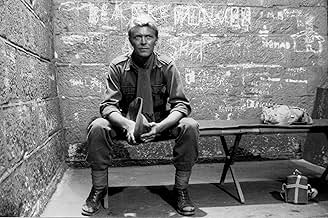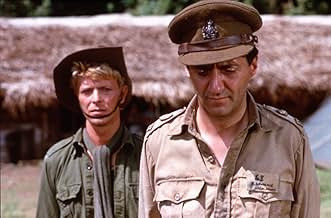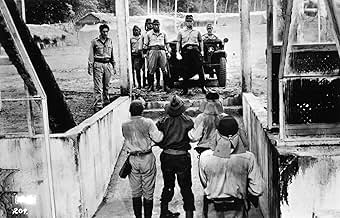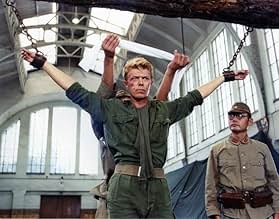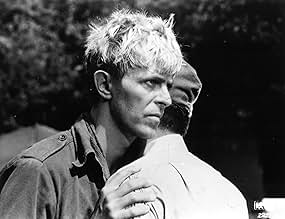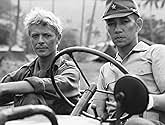Durante la seconda guerra mondiale, un colonnello britannico cerca di colmare le divisioni culturali tra un prigioniero di guerra britannico e il comandante del campo giapponese per evitare ... Leggi tuttoDurante la seconda guerra mondiale, un colonnello britannico cerca di colmare le divisioni culturali tra un prigioniero di guerra britannico e il comandante del campo giapponese per evitare spargimenti di sangue.Durante la seconda guerra mondiale, un colonnello britannico cerca di colmare le divisioni culturali tra un prigioniero di guerra britannico e il comandante del campo giapponese per evitare spargimenti di sangue.
- Regia
- Sceneggiatura
- Star
- Ha vinto 1 BAFTA Award
- 10 vittorie e 8 candidature totali
- Hara
- (as Takeshi)
- Kanemoto
- (as Johnny Ohkura)
- Commandant of Military Prison
- (as Yuya Uchida)
- President of the Court
- (as Ryunosuke Kaneda)
- Lieutenant Iwata
- (as Takashi Naito)
- Interpreter
- (as Rokko Toura)
- PFC Yajima
- (as Yuji Honma)
Recensioni in evidenza
The movie looks at what it means to be human and afraid. It examines how shame and cowardice haunt most men of noble heart. It reveals our commonalities to be undeniably more powerful and real than our transitory differences. It shows how truly stupid man must be to perpetuate the horrors of warfare and to mar his soul by using power to hurt others.
It's a 10/10 in my book, but realistically speaking, if most people agreed, well, there wouldn't be any grist for this mill.
The story sets in Indonesia in the second world war, and tells the tale of a couple of British soldiers out in a Japanese camp for prisoners of war.
It gives us insight between the raging camp of the British soldiers with their Japanses guards. It tells the tale of prisoner Mayor Jack Celliers, a rebellious and confronting individual. It tells the tale of Prisoner Kolonel John Lawrence, who tries to build bridges between the two cultures who collide ever so often. It tells the tale of prison camp leader Captain Yonoi, who makes an effort in running things smoothly with understanding for his prisoners, but who, by the arrival of Mayor Jack Celliers, is being pressured, and discovers a whole new side of emotional understanding. It tells the tale of ward Seargant Hara, who doesn't seem to want to understand the prisoners, and would rather execute them than have them here.
Those 4 main characters come to interact with each other in very interesting ways, and the whole story rises to a dramatic climax which leaves it's impact.
The first degree acting makes this one of the most important things to watch this movie. Both British music legend David Bowie (As Jack Celliers) as well as Japanese music sensation Ryuichi Sakamoto (as Captain Yonoi) both have the lead in this epic picture. For Bowie it isn't this first time he appears on the big screen (The man who fell to earth, The Hunger),but it can be said that this is the role for which he will be remembered. Debuting here, Ryuichi Sakamoto plays the arrogant, and piped down captain Yonoi, and he doesn't make a bad figure with this. Truth is both musicians play very good, but the best parts are for debuting (at the time) comedian Takeshi Kitano (Srgt. Hara Ginko, and stage actor Tom Conti (John Lawrence) who steal the show. Conti's uptight and friendly character gives a lot of sympathetic gestures from the audience, and Takeshi has both the laughs and cry's (Watch the final scene) at his hand, for playing such a funny bastard.
Nagisa Oshima's direction is strong, and he leaves room for artistic influence for both cast and crew. He knows what he wants too show, and doesn't make the mistake of being to dramatic, or being to soft, on crimes that his fellow country committed in 1945. He stays realistic which works as a pro for this film.
The cinematography is beautiful, as well as the set and surroundings, but mostly, it is the score, the music, written by Sakamoto which leaves the most impression. A big plus, on all fronts and a absolute classic in it's genre. A must have and must see.
We then see Lawrence following Hara and then Ryuichi Sakamoto's beautiful, eerie music starts off the opening credits. I won't dive any deeper into the plot, as one should witness it for themselves. The film shows us how the prisoners and the guards are not all that different, they both view themselves as being right, when at one point in the film some one says no one is right in war. The film also shows us the physical and the mental abuse the prisoners had to live with day in and day out.
Besides dealing with the war it also shows how man deals with events from the past as far as ones childhood, But in this film it actually works, not like in countless others, and you do feel attached to the characters.
A lot has been said about David Bowie's performance as Major. Jack Celliers, who despite the title of the film is the lead character and does an excellent job portraying a burnt out commando with a past he is afraid to face.
Shortly after seeing the unsubbed version, I saw the subbed version. Which is good in its own right, but I feel the film doesn't have the same impact if you know what is going to happen at every corner, now about half of the film is in Japanese for those with patience it pays off. By not knowing whats going on it puts you in the position of the prisoners themselves.
The film is a beautiful, tragic look at the atrocities man commits to himself. I encourage film and WW II buffs looking for something different to give it a chance. Another unseen by many gem directed by Nagisa Oshima. ****/****
Only few works introduce a balanced vision of the conflict in the Pacific which opposed the Allies to the Japanese forces during WWII. It is not so frequent that a Japanese film director deals with what is still a critical theme in Japan. MCML is based on a novel written by Sir Laurens van Der Post, a South-African anthropologist who served in the British Army during WWII. Director Nagisa Oshima has brought many alterations to the original material. Van Der Post wrote a semi-autobiographical novel where his war-time memories are blended with his experience in Japan and his ethnological background. Oshima put most of his favorite themes into the film; he found in the novel the material to question traditional Japanese values, opposing them to Western ideology, and his film breaks free from its source but also from any definite film genre. "The Seed and the Sower" and MCML are remarkable because they present a diversity of themes reflecting their authors' preoccupations and some of the subjects they have approached in their careers.
MCML deals with people isolated from the rest of the world under artificial circumstances. As Oshima's work is closer to a psychological drama than to the war film genre, he has obviously favored unity of place to focus on a small group of characters. The plot is set in a very particular context (WWII) when Great-Britain with its allies and Japan were directly fighting against each other in Asia. The opposition between the Asians and the Westerners is a clash opposing colonial empires, races and cultures. None of the main characters is in his homeland nor defends it directly. Java (a Dutch colony) is a sort of no man's land where the British struggled to protect their colonies and where the Japanese fought to expand their conquests, hence the confrontation of two colonial empires. The presence of Korean guards is another hint to the Japanese expansion in South-Eastern Asia. Oshima gave a Japanese name to De Jong's rapist (Kanemoto), alluding to the attempt to obliterate Korea's native culture and its distinctive national features. He gives thus details on the Japanese colonizing proceedings (importation of cheap labor forces, denial of local cultures, propaganda...) yet such elements always remain in the background of the main action. A recurrent theme in some of Oshima's works is the fate of Korea during WWII and the methods used by the Japanese Imperial Army to take advantage of Korean soldiers.
Homosexuality is a key-element, much more important than in "The Seed and the Sower". The POW camp is an all-male world where most impulses are subconscious. Humiliation plays an important part in most relationships between the prisoners and their gaolers. Therefore it is not really a surprise to find that the « story within the story » about Celliers's youth is also about humiliation. The film is about the loss of dignity, not simply the loss of honor. Another recurrent theme is latent homophobia. Kanemoto and his victim, De Jong, are two oppressed characters. As a Korean soldier, Kanemoto turns his humiliation against one of the prisoners. De Jong is a kind of scapegoat who has to bear physical and moral humiliations. There is a parallel between him and Celliers's young brother who is the other scapegoat of the film (the flash-back sequence is about the boy's bullying). Kanemoto and De Jong's story bears indeed on Celliers and his relationship with Yonoi. De Jong and Celliers have to disappear so that the previous order can be restored, just as the sacrifice of a scapegoat supposedly brings back peace and order. Kanemoto and Yonoi both head for disaster once they go too far. Yonoi's attitude hints at what can happen when the fascination for Westerners is too strong. Of course the homosexual subtext concerns mainly Celliers and him. To play the two characters, Oshima deliberately chose two rock-stars (Bowie and Sakamoto) who have both androgynous features. Sakamoto named the music theme "Forbidden Colors" after the title of a novel published by Japanese writer Mishima in 1951 ("Forbidden Colors" is precisely about a young homosexual and his relations in post-war Tokyo. The title of the work is also an allusion to the colors that the emperor of Japan and his family had once the privilege to wear and that were forbidden to ordinary people, a reference to the traditional values of Japan and their disappearance after WWII). Yonoi as a character can be regarded as a metaphor for modern Japan attracted to Western lifestyles and values. Celliers is both a foil and a mirror, being his enemy and his double, with a parallel destiny. That is probably why the Japanese officer is doomed at the end of the film, a difference with Van Der Post's novel where Yonoi survives seven years of prison. Yonoi's behavior condemns him — another reference to Mishima's works where Eros and Thanatos are often related to each other. Celliers's morals are not very clear either. His arrival is heralded by Hara's sarcastic comment: « One more homosexual ». In the scene when Celliers and Lawrence talk to each other through the wall of their cells, as an introduction to his own narration coming after Lawrence's depiction of his love affair with a mysterious woman (the only heterosexual relationship mentioned in the film), Celliers states that he does not have much experience of that kind, his words being rather vague.
MCML raises also questions on the nature of war, on what makes people friends or enemies, etc. There is plenty to enjoy in this haunting film, well acted, well directed, with an unforgettable score. Very close to a masterpiece.
The acting in the movie is adequate without ever being great (the notable exception being Tom Conti who is fantastic in his role as the misunderstood titular character).
However, the movie moves beyond the acting and once you are embroiled in the atmosphere and realism you become oblivious to any acting shortcomings.
The movie must be one of the most accurate depictions of human nature in a war. It has a diverse range of characters yet none of them becomes a caricature. It certainly doesn't sink into the good vs evil mindset that many war movies do.
The violence is graphic and shocking despite lacking the visceral realism of Spielberg's later war movies.
The ending of the movie still affects me, even after repeated viewings. I still have to a lump or two to stop from crying even now.
Overall, recommended for anyone with an interest in a non-stereotypical movie about war. Not for the faint of heart though.
Lo sapevi?
- QuizAccording to David Bowie, Nagisa Ôshima directed the Japanese actors with great detail. But when it came to the British actors, they were told to "do whatever it is you people do".
- BlooperIn the final scene in the prison cell, the cross belt of Lt Col Lawrence's Sam Browne is fitted back to front.
- Citazioni
Col. John Lawrence: You are the victim of men who think they are right... Just as one day you and captain Yonoi believed absolutely that you were right. And the truth is of course that nobody is right...
- ConnessioniFeatured in David Sylvian & Ryuichi Sakamoto: Forbidden Colours (1983)
- Colonne sonoreRide, Ride, Ride (Celliers' Brother's Song)
Composed by Stephen McCurdy
I più visti
- How long is Merry Christmas Mr. Lawrence?Powered by Alexa
Dettagli
- Data di uscita
- Paesi di origine
- Lingue
- Celebre anche come
- Merry Christmas Mr. Lawrence
- Luoghi delle riprese
- Rarotonga, Isole Cook(prisoners camp in Java)
- Aziende produttrici
- Vedi altri crediti dell’azienda su IMDbPro
Botteghino
- Lordo Stati Uniti e Canada
- 2.306.560 USD
- Fine settimana di apertura Stati Uniti e Canada
- 99.221 USD
- 28 ago 1983
- Lordo in tutto il mondo
- 2.376.612 USD
- Tempo di esecuzione2 ore 3 minuti
- Colore
- Mix di suoni
- Proporzioni
- 1.85 : 1
Contribuisci a questa pagina



